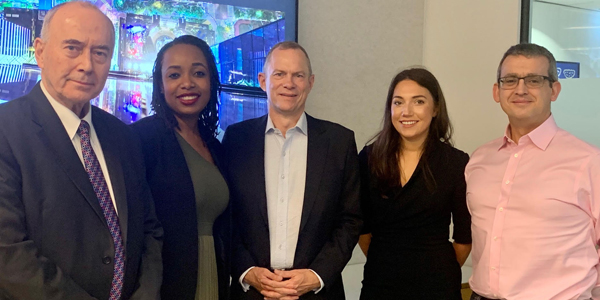The big world of ESG: how funds are reacting
Tim Hodgson, the co-founder, with Roger Urwin, of the ‘Thinking Ahead Institute’ in 2015 -which is sponsored and overseen by Willis Towers Watson – gave big investors a lot to think about last week with respect to climate change. It’s scary for us individuals and also scary for investment professionals.
Hodgson led the annual Thinking Ahead Institute series of seminars, at which the latest ideas and research are presented to clients and other interested parties, in Sydney and Melbourne last week (March 10 in Sydney).
The whole series of events, with packed auditoriums, was about new ways to both look at increasing returns, such as through the ‘Total Portfolio Approach’ to replace strategic asset allocation (see separate report this edition, to risk management through ESG, especially the impact of climate change.
An example of Hodgson’s view was that the world had not been paying for the true cost of its manufacturing and distribution waste. “We have run down our natural resources and converted that to profits. It’s considered by some to be ‘theft’, because we have taken things from the people without their consent,” he said.
As an added, sober, thought, if the world stopped producing carbon emissions today, it would still keep warming. Good luck to the grandkids.
Climate change was about complex systems which were not linear, Hodgson said. For instance, a world of 2-degrees-centigrade is a lot more dangerous than a 1.5-degrees world. “We have built an economic machine which is propelling us to mass extinction,” Hodgson said. “We need a 1.5-degree economy, but we currently have a 4.0-degree economy.”
He said he didn’t know what a new system would look like, but the current system had to be re-plumbed. “Do we need to kiss goodbye to 5 per cent of our portfolio to better protect the other 95 per cent? This would require mobilisation of capital on a massive scale.”
Marisa Hall, co-head of the Thinking Ahead Institute, said investment had always been a ‘3-D’ proposition: “It’s always been about risk, return and impact,” she said. The Industry needs to grapple with trust, diversity and sustainability. “We are slowly and surely becoming ‘woke’. Asset owners everywhere are looking for a better alignment of values with managers.”
As an aside, the word ‘woke’ has become a popular word in the past couple of years to describe being awakened to a range of injustices, prejudices, denials and ignorance. It has its origins in African-American jargon as in: “I was asleep and now I am woke”, which grew out of the big racial conflicts of the 1960s in the US, starting with the famous ‘March on Washington’ in 1963. A record crowd of more than one million people, black and white – a record which has not been matched subsequently – demonstrated before the White House to be entertained by a youthful Bob Dylan and Joan Baez, who were making their debuts on the world stage.
Marisa Hall asked at the Sydney investment event: “What does it mean to create value and which stakeholders are you creating value for?” She said you should be careful where you draw your “value creation boundaries”. Value was in the eye of the beholder, she said. “It’s not just about shareholders and clients, it’s also about trust and transparency. It’s not just about employees either and how you can improve their remuneration. It’s also about improving the culture.”
Becka Bannan said that Willis Towers Watson had been on a journey from ‘monitoring’ to ‘engagement’. A while ago the firm identified three strategic priorities for their work with asset managers. They were, she said: sustainable investing; culture; and, diversity.
“Stewardship is an opportunity for our industry,” she said. “We’ve conducted about 120 culture reviews of managers under our new approach. We’ve down-graded eight and walked away from five,” she said. The main reason from walking away from a manager was the firm’s reliance on a key person, she said. “The investment industry is shifting from an individual game to a team sport.”
– G.B.










